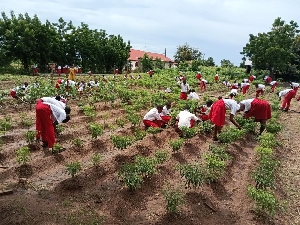 Students at the Northern College of Science and Technology actively engaged in farm work
Students at the Northern College of Science and Technology actively engaged in farm work
Stakeholders in the Yendi Municipality are urging the government to emulate the Northern College of Science and Technology's school farming system to ensure students have a steady supply of nutritious meals during school sessions.
Over the past six years, the Northern College of Science and Technology has successfully implemented its school farming system, utilizing the school backyard as a classroom for practical agriculture lessons.
The concept involves using the school premises for farming, teaching students valuable agricultural skills, and fostering a spirit of self-help and independence crucial for their future.
Despite widespread acceptance of this concept as a means to cultivate interest in agriculture among Ghanaians, it was removed from the school curriculum.
Nathaniel Adams Jnr, the Principal of the Northern College of Science and Technology, shared insights into the benefits of this farming system, stating, "The school has been practising the farm system for the past six years, significantly reducing the cost of feeding students. We produce cereals, rice, and maize, and everything we consume is sourced from our farm. We also raise catfish, guinea fowl, and turkeys for meat. Our students even enjoy an egg a day from our poultry."
To instill a sense of responsibility, students are involved in farm activities in groups, as explained by Team Lead Baku Mushina: "We divide ourselves into groups to water the plants, feed the animals, and engage in various farm activities. We learn practical skills that will be valuable in our future endeavors."
The Yendi Municipal Director of Agriculture, Alhaji Abubakari Mohamed, commended the school for its outstanding contributions to agricultural education, expressing confusion about the decision to remove the concept from the basic level.
He emphasized the importance of passing down agricultural knowledge, stating, "In the past, when you followed your father to the farm during the weekend, you would share what our Agric Master taught us, and they would implement it. I am sure if we had continued, our agricultural level would be much higher."
The Kuga Naa, who generously provided the school with acres of land, encouraged other chiefs to follow suit and allocate land for similar projects, emphasizing that agriculture is the backbone of the country, and concerted efforts can ensure food security.